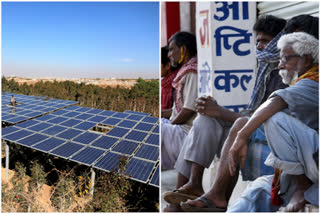New Delhi: Nearly 20 leaders from think tanks, research groups, renewable energy companies, sustainable development organisations and industry associations on Thursday said India's weak healthcare infrastructure in rural areas are being exposed due to the ongoing COVID-19 pandemic.
In a letter to the government of India, they called for action, making the case for solarising all unelectrified sub-centres in rural India.
The ongoing COVID-19 crisis has highlighted several existing systemic gaps in services, especially to the rural poor.
Inadequate healthcare infrastructure is one of them. Over 39,000 sub-centres, the first point of contact between the primary healthcare system and the community, serving 230 million people in rural India lack electricity.
This severely impacts their capacity to offer optimal healthcare to patients.
Decentralised renewable energy (DRE) can play a significant role in solving this problem quickly and affordably, for less than Rs 30 per person in initial capital expenditure.
The letter outlines four key interventions that the government can undertake in order to help alleviate the situation.
They are:
- Expanding the programme to solarise clinics, drawing from the example of Chhattisgarh which has successfully done this.
- Allocating dedicated funding towards this initiative, which would amount to just 0.6 per cent of the current 2020-21 energy and healthcare budget.
- Ensuring long-term operations and sustainability by working through existing structures.
- Promoting innovation in order to develop more financially viable and energy-efficient medical equipment.
The letter is being sent to the Ministry of Health and Family Welfare, the National Centre for Disease Control, the National Health Systems Resource Centre, the Ministry of New and Renewable Energy, the Ministry of Power, and Niti Aayog.
"Sustainable health infrastructure that leverages innovative, decentralised and energy-efficient solutions will bring huge dividends for health in rural India," Centre for Environmental Health Deputy Director Poornima Prabhakaran said.
"Transitioning to renewable energies across healthcare operations will ensure efficient service delivery and improved health outcomes."
(IANS Report)
Also Read: India's COVID-19 recovery rate has improved to 24.56 pc: Niti Aayog CEO
